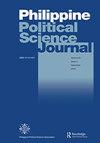东盟与南海大国:法律、外交和威慑在缓和主权声索中的作用
Q3 Social Sciences
引用次数: 0
摘要
本文重点探讨了南海对于东南亚国家联盟(东盟)和主要大国日益上升的战略意义。文章追溯了南中国海(SCS)争端的起源,以及直接涉及的声索国(中国、越南、菲律宾、马来西亚和文莱)。然后研究了为什么均势因素已经并将继续影响地区国家和主要外部大国(中国、美国、印度和日本,以及澳大利亚和加拿大等其他相关中等国家)的角色。报告认为,南沙群岛是一个国际海洋制度(全球公域),因此受国际法,特别是《联合国海洋法公约》(UNCLOS)的原则和实践的约束。根据国际法,任何将南沙群岛国有化的企图都将遭到拒绝,常设仲裁法院(PCA)2016 年就菲律宾 2013 年就其与中国的争端提交海牙法院进行强制仲裁一事做出的裁决就证明了这一点。报告指出,东盟在如何应对中国在南中国海的强硬行为上缺乏一致。报告认为,只有采取动态的力量平衡方法,包括外部力量与地区利益的接触,才能通过维护法治的首要地位、公海自由以及所有声索国的合法权益,为外交和对话创造必要的空间。本报告的结论是,法律、政治、外交和威慑是需要战略管理的互动变量,以促进南海的共同利益、稳定和安全。本文章由计算机程序翻译,如有差异,请以英文原文为准。
ASEAN and the Major Powers in the South China Sea: the Role of Law, Diplomacy, and Deterrence in Moderating Sovereignty Claims
This article focuses on the rising strategic significance of the South China Sea for the Association of Southeast Asian Nations (ASEAN) and the major powers. It traces the origins of the South China Sea (SCS) dispute, and the claimants that are directly involved (China, Vietnam, Philippines, Malaysia, and Brunei). It then examines why balance of power considerations have influenced and continue to influence the role of regional states as well as the major external powers (China, United States, India, and Japan, together with other interested middle powers such as Australia and Canada). It argues that the SCS is an international maritime regime (global commons), and therefore subject to the principles and practice of International Law, specifically United Nations Convention on the Law of the Sea (UNCLOS). Any attempt at nationalisation of the SCS will be rejected under international law, as evidenced by the 2016 decision of the Permanent Court of Arbitration (PCA), with respect to the submission in 2013 by the Philippines on its dispute with China, for compulsory arbitration by the The Hague Court. It notes the lack of unity in ASEAN over how to deal with China’s assertive conduct in the SCS. It suggests that only a dynamic balance of power approach, which includes external power engagement with regional interests, will create the necessary space for diplomacy and dialogue by upholding the primacy of the rule of law, freedom of the open seas, and the legitimate rights and interests of all claimant states. It concludes that law, politics, diplomacy, and deterrence are interactive variables requiring strategic management to promote shared interests, stability and security in the South China Sea.
求助全文
通过发布文献求助,成功后即可免费获取论文全文。
去求助
来源期刊

Philippine Political Science Journal
Social Sciences-Political Science and International Relations
CiteScore
1.00
自引率
0.00%
发文量
17
期刊介绍:
The Philippine Political Science Journal (PPSJ) is an internationally refereed journal and the official publication of the Philippine Political Science Association (PPSA). The PPSJ welcomes articles dealing with the politics and international relations of Southeast Asia. Manuscripts may focus on individual countries of the region but comparative articles about the countries in the region and the region as a whole are especially welcome.
 求助内容:
求助内容: 应助结果提醒方式:
应助结果提醒方式:


